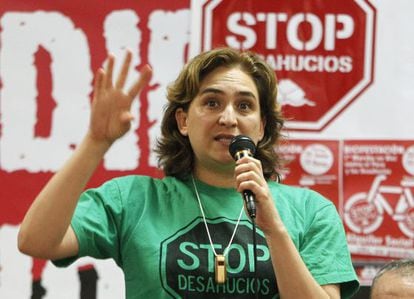“In Spain you can be a mobster but still merit full institutional approval”
Mortgage Victims Platform spokeswoman says Spain is mishandling evictions

"One, two, three, heave!" Lifting the roll-up grille gate at the Barcelona headquarters of the Mortgage Victims Platform (PAH), the grassroots organization that is fighting home evictions in Spain, was my good deed of the day.
I was trying to help PAH spokeswoman Ada Colau, the movement's most visible face, but there was also a selfish motive. I wanted to see the working space of one of this country's most successful and active social groups.
Home evictions are among the most dramatic consequences of the ongoing economic crisis. In a country with extremely high home ownership rates and unemployment levels at 26.3 percent, the highest figure in the euro zone after Greece, growing numbers of people find themselves unable to meet their monthly mortgage payments. In the last three years, the number of foreclosure claims reaching the courts has nearly quadrupled, according to the General Council of the Judiciary legal watchdog. In the first half of 2012, evictions rose 14 percent compared with the same period in 2011.
The situation is such that judges have begun to find creative ways to interpret the law to temporarily suspend evictions ahead of a European court decision that found Spanish mortgage legislation abusive to consumers and called on the government to change the law accordingly. Meanwhile, the PAH collected enough signatures to introduce a Popular Legislative Initiative in Congress asking for the widespread adoption of "dation in payment" — letting borrowers in default return their house keys to the bank and walk away debt-free.
Inside PAH HQ, everything looks appropriately spartan and secondhand, as I suppose befits a grassroots movement. Colau sits down for the interview and a torrent of words pours from her mouth, making one either want to join the fight or, for detractors, just give up. This 39-year-old from Barcelona is the public voice of many people who have been evicted or are about to be so, and have united in the fight against the system. Colau's support of controversial actions such as escraches — public protests outside the homes of government officials — has turned her into the great hope of many progressives and the bête noire of the ruling Popular Party (PP), some of whose leaders have gone as far as to compare her with ETA terrorists.
Question. Are you ETA?
Answer. Evidently not. Having to say it already shows you the political level of our country and our government. It's ridiculous.
Q. The organization you speak for is facing a chronic problem, housing, and the drama of evictions. Is any country handling things well on this front?
A. Nobody is handling it perfectly, but no other country does it as badly as Spain. It's a negative example for the world. Ultraliberal media outlets come to see it and they are shocked: what's going on here is incomprehensible, even from that ideology. If you exclude millions of people from the system for life, you are generating an underground economy and no incentives to return to economic activity.
Q. Did you find any case especially moving?
A. All of them, because contrary to what the PP would have us believe, no cases are more serious than others. There is extreme vulnerability in all of them. Losing your home breaks up families and breaks people down emotionally. Even if we manage to change the law and solve the cases that come to us, there is going to be a traumatized generation.
Q. How do people respond when their eviction gets halted?
A. More than with gratitude, they respond with personal involvement. Regardless of what response it manages to elicit from the government, the PAH has won already. People arrive here with their self-esteem at rock-bottom levels, they find support, and they feel the desire to help others. It's a process that nearly everyone describes as like being born again: turning from a victim into an activist. It's the most beautiful thing I have seen in my life.
Q. Aren't individuals responsible for setting their own traps by signing on to enormous mortgages?
A. They are not denying their share of responsibility. What did people understand and what was explained to them at the bank when they signed the papers? That the bank would appraise the home and say it was worth, say, 300,000 euros, which is why they would give you 250,000, 300,000 or more. The bank then said: "Don't worry, if you can't pay, you just sell the house, no worries." Not the bank, not the realtor, not the notary, not the government explained that you could lose the home and be stuck with debt for the rest of your life. If they had, many people would not have gotten into mortgages. The banks drafted contracts filled with abusive clauses, they lied and they swindled people. It's amazing that more serious things are not happening in this country, it's a scandal.
Q. What are your negotiations with the lenders like? This situation is also a problem for them.
A. It's a problem, but they know they will be systematically bailed out. Some retire with millions of euros, others remain in their posts with millionaire salaries. Spain's economy minister is Mr \[Luis\] de Guindos, who was previously an executive in charge of one of the failed banks \[Lehman Brothers\]. The official message is that you can be a mobster, a swindler, you can sink a national economy, and still get full institutional approval. When we began negotiating with the banks, we ran into scorn and humiliation. But David is beating Goliath. We've discovered their weak point: their public image. Standing in front of their offices explaining to people that this bank is swindling their customers has forced them to sit down and talk.
Q. Do you want them to disappear then?
A. No. It would be childish to think that we shouldn't have some form of economic organization. Of course you need some kind of banking system, either public or with real democratic oversight, emphasizing the population's basic needs and putting human life and dignity above personal interests.
Q. Were you always this much of a fighter?
A. Yes. I always had critical views on social issues. Otherwise I wouldn't have studied philosophy, which does not exactly help you get a well-paying job.
Q. When did you realize you wanted to become a social superhero?
A. Not a superhero. The PAH's most important message is that the little people, if they get organized and help each other out, can move mountains and achieve things that seemed impossible. If you present it like a job for superheroes, then you send out the message that it's really complicated, and that's false. That's what the powers that be want us to believe.
Q. You have lived in squatter homes. What is your vision of squatting? Do you feel it's legitimate?
A. Of course, now more than ever. Spain is the European country with the biggest stock of empty homes, and simultaneously the country with the highest eviction rates. Forceful eviction over economic motives is the worst violation of the right to a home. It should be the last resort, but in Spain it is the first. It may be legal, but it is absolutely immoral.
Q. Then you are questioning private ownership of real estate?
A. We need to question forms of tenancy. People have the right to a safe, stable home, perhaps for their entire lives. This can be achieved in various ways. Here in Spain it has been developed solely through private ownership, and we were told that it was the most stable form. But now that's false: thousands of people were not owners, just debtors. And renting is not a real alternative because it was already precarious and the PP has just made it more so by reducing five-year leases to three-year leases, and that's not stable housing. We have to demand quality rentals and private ownership that is not speculative.
Q. Do you lead an austere life?
A. I don't need much. I don't see it as a renunciation, either: I have no car, no properties, no expensive whims.
Q. What are the things that make you feel fulfilled, then?
A. I have realized that less is more. Sharing experiences with others at the association is what makes me feel satisfied. It's one thousand times more satisfying to live with less than to be part of this consumer society that promises happiness and ultimately only makes you feel lonely, poor and unhappy.











































